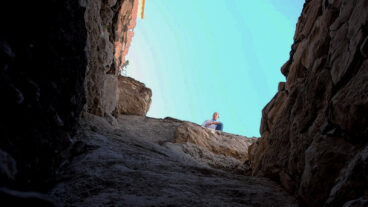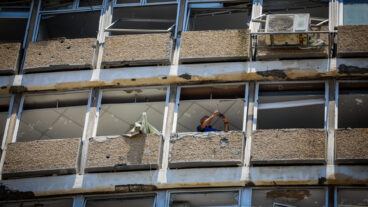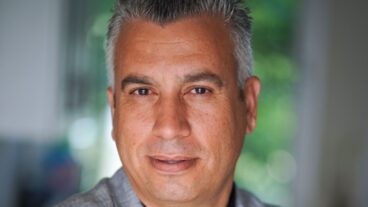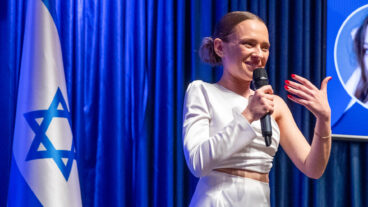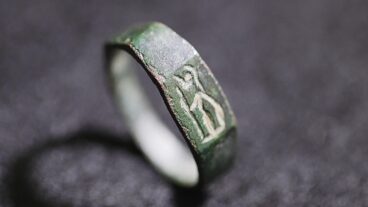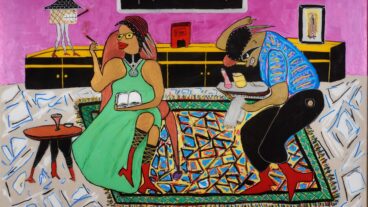Dr. Drora Zarfati with some of her patients: Ultimately, I couldn’t refuse this kind of mission. You can’t only go when it’s comfortable for you.When you mention Darfur refugees, most Israelis think about the hundreds of Sudanese who have streamed into Israel this year and the controversy and confusion over what the government should do with them.
However, Dr. Drora Zarfati, an ophthalmologist from the Emek Medical Center in Afula, sees the issue of refugees from Darfur in a different light, so to speak – she’s just returned from two weeks of performing dozens of eyesight restoring surgical procedures, and treating ocular diseases for south Sudanese refugees at the Kakuma refugee camp in northern Kenya.
“It’s unbelievably difficult conditions there,” Zarfati told ISRAEL21c, upon her return to Israel last week.
The Kakuma camp, located about 30 miles from the Sudanese border, houses over 75,000 people, mostly south Sudanese refugees, but also refugees from Ethiopia. The Center for International Cooperation (MASHAV) at the Israeli Ministry of Foreign Affairs, has been working in conjunction with the UN High Commission for Refugees (UNHCR) office in Nairobi to offer assistance to Sudanese refugees. Together, under the direction of Dr. Yossi Baratz, MASHAV’s medical projects coordinator in Africa, they set up a temporary eye clinic near the camp utilizing medical equipment purchased by MASHAV.
Baratz then recruited Zarfati and Dr. Nir Zaider from Rambam Hospital in Haifa to travel to the region to treat refugees with eye problems.
“This was actually my fourth mission for MASHAV – I had been in the past to Angola and Benin and really found it worthwhile. This year, they told me they had a really unique mission – at an eye camp for south Sudanese refugees from Darfur at a camp in northern Kenya,” she recalled.
Understanding that it would likely be a more harrowing and demanding trip than her previous endeavors, Tzarfati deliberated for a day and spoke with Baratz, who admitted the conditions wouldn’t be great. But he explained that the team would be staying at a UN compound near the refugee camp and the conditions would be “reasonable,” said Tzrafati.
“Ultimately, I couldn’t refuse this kind of mission. You can’t only go when it’s comfortable for you. The previous missions weren’t so easy, but I knew this one would be harder.”
In reality, Tzarfati found the mission much more difficult than she expected, but much more satisfying as well.
“The second night we were there, our quarters, which were provided by UNHCR, were flooded, and we had to evacuate in the middle of the night. Two assistants from the local hospital actually drowned in the floods, and the next day, when we returned, our rooms and all our belongings were wet and muddy,” she said. “That was quite an experience.”
But it paled in comparison to actual working conditions under which Tzarfati and Zaider performed.
“On a typical day, we would go to the hospital at the refugee camp, and there’d be no electricity. They’d have to find a generator, so meanwhile, we’d start checking patients with flashlights. No form of eye surgery had ever been performed at this clinic – the staff that assisted us had no knowledge of this kind of operation whatsoever, so that was quite a challenge.
“We would generally check about 60 to 80 patients a day who came from the camp. We would screen them and select those that needed surgery. And by 10 am, we would start operating for the day until the evening. The next morning, we’d check the recovering patients from the previous day and start over again. That basically repeated itself for the whole time we were there,” added Tzarfati.
All told, the two ophthalmologists checked and screened some 500 patients, mainly adults who had cataract problems, and performed dozens of operations. Zaider, an expert in an eyelid procedure which corrects what’s called ‘droopy’ eye, also performed a number of those operations.
On Sunday, when the local staff had the day off, Tzarfati and Zaidel visited the refugee camp themselves, met with some of the refugees and heard their stories which included descriptions of villages being burned and young children being killed.
“Even with their tragedy, the people gathered around us and thanked us for coming.
Some of them knew we were from Israel, and they said they were grateful to us,” she said.
Tzarfati, who studied medicine at Hadassah Medical Center and interned at Meir Hospital in Kfar Sava, chose ophthalmology for her specialty after taking it as an elective.
“I don’t regret it one bit,” she said.
She went to the US for a fellowship at Indiana University and studied with Professor Alon Harris, an expert in the field of glaucoma. And upon her return, she began her residency in the glaucoma clinic of Emek, where she still practices.
“I was exposed to MASHAV and their activities from a doctor in my department when I did my residency. He went on their behalf to conduct a clinic in Africa. When he got back, he was very enthusiastic about the experience, and I thought that if I got the chance later, it was something I wanted to do,” she said.
MASHAV has been conducting blindness prevention and eye-care missions in partner countries for many years – usually under the same model: two ophthalmologists at local hospitals or clinics. The team generally also trains the local personnel, and ophthalmologic equipment and supplies are donated by the Israeli government.
Despite her exhaustion upon returning home, Tzarfati said she’s willing to return to the clinic, or to another location where she’s needed. She hopes that the plight of the Sudanese refugees currently in limbo in Israel will soon be solved, and expressed a willingness to provide her own expertise, if needed.
“I’d be delighted to help the Darfur refugees who are in Israel. It’s ironic as on the one hand, the government sends us to help them there in Kenya, but here there’s some confusion about our policy. I hope there’ll be a decision on how we’re going to relate to this issue,” she said.
“But if I went thousands of miles to help them there, I would certainly and gladly do it here.”![]()




